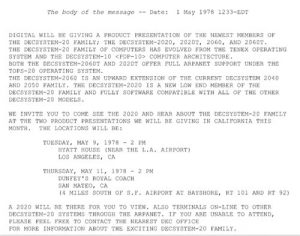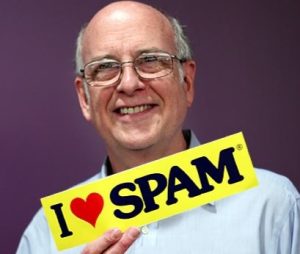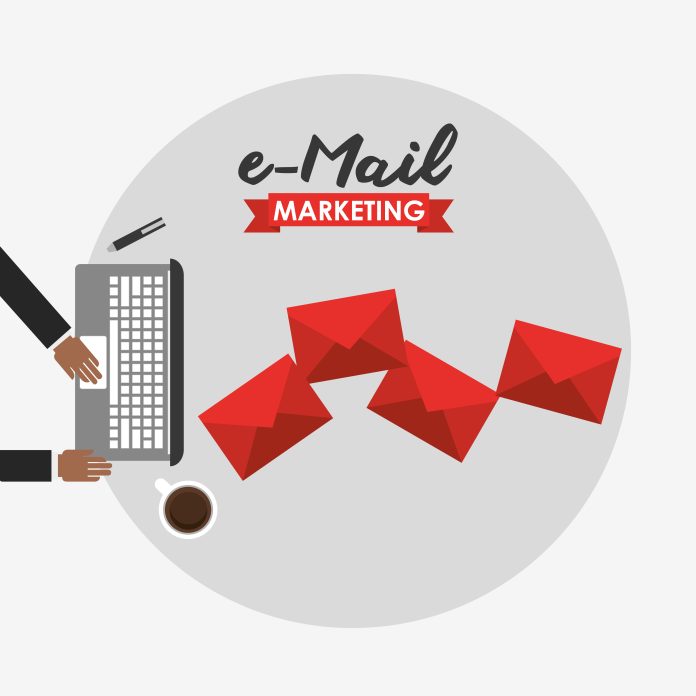Email marketing, notorious for its existence, has seen it all. Only a few digital marketing techniques have been around for as long or caused as much controversy as email marketing. Email marketing has had its fair share of ups and downs since its inception in the 1970s, but it has also emerged stronger and more integral than modern marketing tactics.
Did you know the original email still exists? Have a look:
 As we mark 45 years since Gary Thuerk, dubbed ‘the father of spam,’ sent the world’s first unsolicited mass email, it’s an opportune moment to reflect on its history and ponder its future.
As we mark 45 years since Gary Thuerk, dubbed ‘the father of spam,’ sent the world’s first unsolicited mass email, it’s an opportune moment to reflect on its history and ponder its future.
The Controversial Beginnings

Marketing manager Gary Thuerk of Digital Equipment Corporation (DEC) sent the first unsolicited bulk email to 393 recipients in 1978 using the ARPANET, the forerunner of the internet. Despite the backlash, his special way of promoting DEC’s new range of computers to prospective customers resulted in large sales, proving his strategy was effective.
Businesses saw the marketing potential of email in the 1980s and 1990s when the internet was growing and email was becoming increasingly common. This realization led to the creation of email marketing software and services.
Gary walked so all of the email marketers today could run!
Things Soon Became Spammy
Spam, however, has grown in tandem with email’s popularity. Users and regulators alike reacted negatively to the stream of unsolicited, irrelevant, and often misleading emails that ruined the credibility of email marketing. Humans sure know how to overuse something quickly. To be fair, we all kind of hate it when we get spam emails.
 The British comedy troupe Monty Python first introduced the word “spam” in a skit that reflected the annoying and constant nature of unwanted email correspondence.
The British comedy troupe Monty Python first introduced the word “spam” in a skit that reflected the annoying and constant nature of unwanted email correspondence.
Spammers and anti-spam technology got into a game of cat and mouse because spammers took advantage of vulnerabilities in email protocols to send consumers an overwhelming number of unwelcome messages. Even if laws like the CAN-SPAM Act of 2003 were passed to limit spam, it is still a major problem and accounts for considerable email traffic.
Evolution and Adaptation
Email marketing, however, continued and even improved. Higher engagement and better deliverability were two outcomes that marketers started to see as important outcomes of permission-based marketing, in which receivers willingly opt-in to receive emails. Marketers began using data and audience segmentation to provide personalized content, which became more important.
Email marketing was already an industry game-changer before the rise of marketing automation made it possible to build elaborate systems with the goal of generating more leads and sales. By integrating with CRM systems, marketers could improve their tactics in real-time based on insights gained from improved monitoring of consumer interactions and seamless communication.
Can Email Marketing Survive?
Can email marketing survive and thrive for another fifty years? That is the question that comes to mind when thinking about its future. Email marketing is still strong and an essential tool for marketers, even if it faces competition from new technologies, shifting customer tastes, and new regulations.
The future seems bright, with developments in AI, ML, and predictive analytics paving the way for ever more targeted, timely, and efficient campaigns. Interactive Email and Accelerated Mobile Page (AMP) for Email are two developments that will improve user experience and engagement. At the same time, automation will keep streamlining operations and free up marketers to concentrate on strategy and creativity.
Nevertheless, the capacity of email marketing to adapt and develop in reaction to shifting dynamics will determine its eventual durability. Marketers should emphasize being transparent, relevant, and respectful of their privacy to keep users’ trust and interest. Email marketing has the potential to be prosperous for the next fifty years and beyond if its practitioners are open to new ideas, follow established standards, and put the needs of their target audience first.

